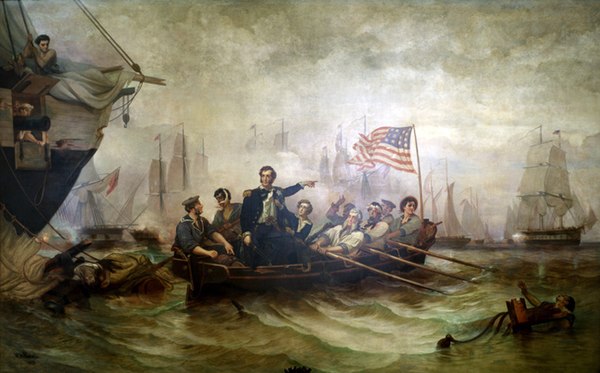 |
| Battle of Lake Erie by William Henry Powell, painted 1865. |
The goal of the British campaign in the War of 1812 in part had been to effecitvely nullify formal portions of the Treaty of Paris of 1783 in which the British king had recognized the existence of the United States out to the boundary of the Mississippi River. In fact, the crown had never withdrawn its troops from the American West after the Revolution, in a typical "come and make me" stance, that was in fact the reality despite anything agreed on paper.
This occupation was principally because the fighting of the Revolutionary War did not actually end at Yorktown in the fall of 1781 (which resulted in the surrender of one British army), but rather kept going for another year and actually ended on a very big down note for the Americans at the Battle of Blue Licks on the Kentucky frontier in August 1782.
Although the British subsequently agreed on paper to formally withdraw from the West, the failure of the Americans to drive them out of Kentucky by force left the British in partial de facto military control of the Northwest for another generation.
The Americans were no position to enforce the treaty until the next war, which broke out in June 1812. At the time, the most crucial lacking piece of this defense of the West had been the American inability to defend the Lake Erie coast of Ohio against at-will British incursion from Canada. This was finally accomplished in Sept. 1813. With this victory, and the equally critical victory at New Orleans in early 1815* which sealed the southwestern frontier and the Mississippi, America had seemingly won its true independence from Britain throughout its entire territory.
Now, only a few years later, the same new states carved out of this liberated frontier, both North and South, were seemingly rushing headlong to achieve the goal of reintegration into the British hierarchy. The submission to London was less format but just arguably as potent in the sense of being under someone's dominion. The American states would keep their formal autonomy, but in practice they would be brought into a line of cooperation with British policies over time through their permanent admittance to the circle of Post-Vienna-era British dominated world banking. This is what many feared would happen, at least.
Other Americans were less critical of the threat this posed. They realized that doing business with British banks this was simply the way of the world now. Everyone did it. Even the French had to play ball. Everyone benefited, arguably, and formal autonomy was nothing to sneeze it (so long as it could be kept).
*The above mentioned result, which among other things celebrated in a famous American Rockabilly song, made the career of the victorious American general, the man who was later credited as being the founder of the modern Democratic Party (a fact contemporary Democrats seem less eager to celebrate). In the Canadian interpretation of history (at least if Wikipedia experience is any guide), this celebration of New Orleans and Col. Jackson is typical America bravado over little substance, since the battle famously took place after the peace treaty had been signed, but before word of it could reach the Southwestern frontier. Thus the result of the battle formally meant nothing that hadn't already been agreed upon. The British stubbornness at evacuating the West after the Revolution due the American disaster in Kentucky in 1872 should be proof enough that the American celebration of the battle as critical to its nationhood is well deserved.
No comments:
Post a Comment